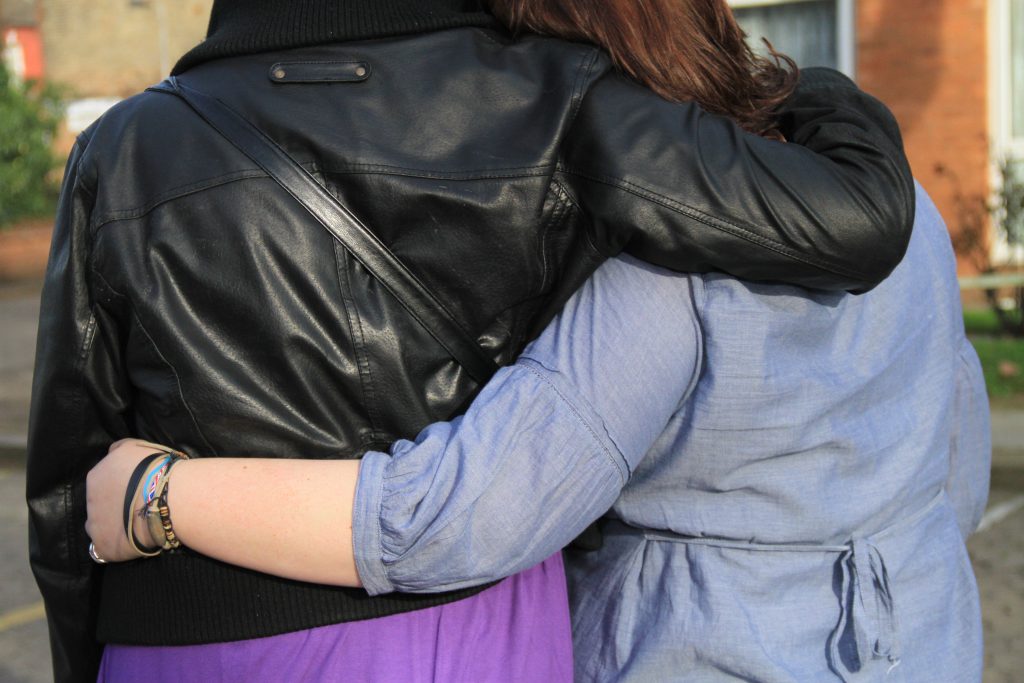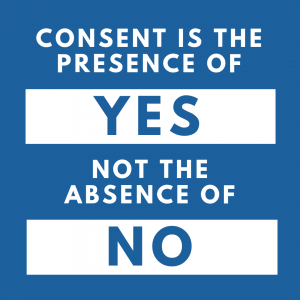Consent
What is consent?
Consent is an agreement between people; it is when one person gives another person permission to do something. When we talk about consent in the context of a relationship we are usually talking about both people in the relationship agreeing to something (for example agreeing to kiss). Consent is an integral part of any relationship and is also a key part of the law.

Under UK law:
- It is an agreement made by someone with the freedom and ability to decide something.
- The person seeking consent has the responsibility to make sure these conditions are met.
- ALL parties must consent before sex or any physical closeness.
What does it mean?
It means that someone is actively agreeing to something and that they are in a position to do so (not being threatened, not unconscious and not too intoxicated to agree).

What does the Law say about consent?
A key concept in consent is that it is more than “no means no”. The absence of yes means that without a sure yes, consent has not been given.
The yes must be given by someone who is in a position to make decisions: they can’t be unconscious, too intoxicated or under threat.
Responsibility is on the person trying to get consent, not the person who gives it.
It is best for consent to be verbal along with non-verbal indicators. Silence is not consent. Non-verbal indicators would be an active engagement in an activity not brought on by fear. Signs which help show consent (but are not consent in their own right) are:
- An openness in body language
- An active participation in the activity
- Smiling and laughing
- Nodding yes
- Initiating an activity
It is important to remember that those non-verbal signs are not consent but indicators that the other person is comfortable with the situation. Verbal consent is still needed.
What if we have done it before?
Consent to one activity is not consent to a different activity. Consent to one activity is not consent to that same activity at a different time.
You may have kissed someone before and want to do it again but that doesn’t mean the other person wants you to. It is important to remember that the other person needs to give consent every time and for each different act.
To help explain it check out this video which uses Tea as an example (Video not working? Click here)
Misreading the signs
In movies and TV programmes we often see a romantic moment leading up to the kiss. Both people are showing non-verbal signs that they want to kiss and then one of them initiates. The problem is, what if one of them has misread the signs?
Most people aren’t as good at reading others as they think they are. Everyone is different and will send out different signs making it hard to know exactly what people are thinking. But by asking you can make sure that you are on the same page and you haven’t misread them.
Isn’t it a mood killer?
But won’t asking them kill the mood? You might be worried that by asking you will kill the mood and ruin the moment. However, asking someone before doing something is the greatest way to show that you respect them and care for them. It may feel embarrassing to start with but it doesn’t have to be said in a clinical way. You can get creative and make it part of the romance. Asking also shows confidence (a very attractive quality).
What if they say no?
So, you have asked and they have told you no – what now? Don’t dwell on it or keep asking them. Respect their decision and move on. Just because they didn’t want to kiss you doesn’t mean you still can’t have fun together by finding an activity you both want to do. And if they are not interested in you at all, then now you can move on knowing there is no uncertainty

In other relationships
Consent doesn’t have to just be about romantic relationships. In other relationships it could include:
- Asking instead of snatching
- Learning when a person likes to hug or not (and respecting their decision)
- Always asking before taking
- Not forcing friends to do things they don’t want to do. This can range from going to the cinema to even forcing someone to smoke, drink alcohol, or take drugs.
Some myths around rape and consent:
When talking about rape we often have an idea about dark alleys but in reality rape is about consent. Rape and sexual assault is defined as any sexual act that is carried out without the victim's active consent. Below are a few myths around rape and consent:
Myth: A rapist is likely to be a stranger who rapes someone in a dark alley.
Fact: Rape can be committed by anyone and anywhere.
Myth: Only loud or flirtatious girls in tight clothes and short skirts are raped or sexually assaulted.
Fact: People dressed in different clothes and acting in different ways have been raped.
Myth: Alcohol and drugs turn people into rapists.
Fact: Everyone is responsible for their own actions regardless of if they are under the influence of drugs or alcohol. (For example, a drunk driver is still responsible if they cause a car crash).
Myth: It is not rape if the victim does not clearly say ‘no’.
Fact: Consent is the presence of YES and not the absence of NO.
Myth: Sexual assault can only happen to women by men
Fact: Sexual assault can be committed by anyone to anyone
Myth: Rape can't happen in a relationship
Fact: Rape can happen anytime someone doesn't give consent (even in relationships)
Getting Support
If you or someone you know has been affected by rape or sexual assault or if you would just like to know more, then check out the links below to organisation who can help:
Rape Crisis: https://rapecrisis.org.uk/
NHS: https://www.nhs.uk/live-well/sexual-health/help-after-rape-and-sexual-assault/
Alternatives Trust East London: http://www.altel.org.uk/
The Survivor's Trust: http://thesurvivorstrust.org/
Support Line: https://www.supportline.org.uk/

Consent
What is consent?
Consent is an agreement between people; it is when one person gives another person permission to do something. When we talk about consent in the context of a relationship we are usually talking about both people in the relationship agreeing to something (for example agreeing to kiss). Consent is an integral part of any relationship and is also a key part of the law.

Under UK law:
- It is an agreement made by someone with the freedom and ability to decide something.
- The person seeking consent has the responsibility to make sure these conditions are met.
- ALL parties must consent before sex or any physical closeness.
What does it mean?
It means that someone is actively agreeing to something and that they are in a position to do so (not being threatened, not unconscious and not too intoxicated to agree).
What does the Law say about consent?
A key concept in consent is that it is more than “no means no”. The absence of yes means that without a sure yes, consent has not been given.
The yes must be given by someone who is in a position to make decisions: they can’t be unconscious, too intoxicated or under threat.
Responsibility is on the person trying to get consent, not the person who gives it.

It is best for consent to be verbal along with non-verbal indicators. Silence is not consent. Non-verbal indicators would be an active engagement in an activity not brought on by fear. Signs which help show consent (but are not consent in their own right) are:
- An openness in body language
- An active participation in the activity
- Smiling and laughing
- Nodding yes
- Initiating an activity
It is important to remember that those non-verbal signs are not consent but indicators that the other person is comfortable with the situation. Verbal consent is still needed.
What if we have done it before?
Consent to one activity is not consent to a different activity. Consent to one activity is not consent to that same activity at a different time.
You may have kissed someone before and want to do it again but that doesn’t mean the other person wants you to. It is important to remember that the other person needs to give consent every time and for each different act.
To help explain it check out this video which uses Tea as an example (Video not working? Click here)
Misreading the signs
In movies and TV programmes we often see a romantic moment leading up to the kiss. Both people are showing non-verbal signs that they want to kiss and then one of them initiates. The problem is, what if one of them has misread the signs?
Most people aren’t as good at reading others as they think they are. Everyone is different and will send out different signs making it hard to know exactly what people are thinking. But by asking you can make sure that you are on the same page and you haven’t misread them.
Isn’t it a mood killer?
But won’t asking them kill the mood? You might be worried that by asking you will kill the mood and ruin the moment. However, asking someone before doing something is the greatest way to show that you respect them and care for them. It may feel embarrassing to start with but it doesn’t have to be said in a clinical way. You can get creative and make it part of the romance. Asking also shows confidence (a very attractive quality).
What if they say no?
So, you have asked and they have told you no – what now? Don’t dwell on it or keep asking them. Respect their decision and move on. Just because they didn’t want to kiss you doesn’t mean you still can’t have fun together by finding an activity you both want to do. And if they are not interested in you at all, then now you can move on knowing there is no uncertainty

In other relationships
Consent doesn’t have to just be about romantic relationships. In other relationships it could include:
- Asking instead of snatching
- Learning when a person likes to hug or not (and respecting their decision)
- Always asking before taking
- Not forcing friends to do things they don’t want to do. This can range from going to the cinema to even forcing someone to smoke, drink alcohol, or take drugs.
Some myths around rape and consent:
When talking about rape we often have an idea about dark alleys but in reality rape is about consent. Rape and sexual assault is defined as any sexual act that is carried out without the victim's active consent. Below are a few myths around rape and consent:
Myth: A rapist is likely to be a stranger who rapes someone in a dark alley.
Fact: Rape can be committed by anyone and anywhere.
Myth: Only loud or flirtatious girls in tight clothes and short skirts are raped or sexually assaulted.
Fact: People dressed in different clothes and acting in different ways have been raped.
Myth: Alcohol and drugs turn people into rapists.
Fact: Everyone is responsible for their own actions regardless of if they are under the influence of drugs or alcohol. (For example, a drunk driver is still responsible if they cause a car crash).
Myth: It is not rape if the victim does not clearly say ‘no’.
Fact: Consent is the presence of YES and not the absence of NO.
Myth: Sexual assault can only happen to women by men
Fact: Sexual assault can be committed by anyone to anyone
Myth: Rape can't happen in a relationship
Fact: Rape can happen anytime someone doesn't give consent (even in relationships)

Getting Support
If you or someone you know has been affected by rape or sexual assault or if you would just like to know more, then check out the links below to organisation who can help:
Rape Crisis: https://rapecrisis.org.uk/
NHS: https://www.nhs.uk/live-well/sexual-health/help-after-rape-and-sexual-assault/
Alternatives Trust East London: http://www.altel.org.uk/
The Survivor's Trust: https://www.thesurvivorstrust.org/
Support Line: https://www.supportline.org.uk/
